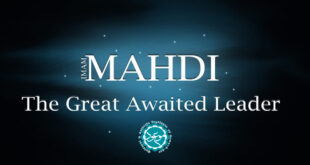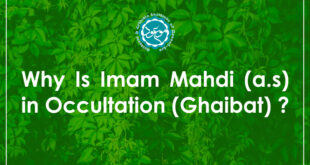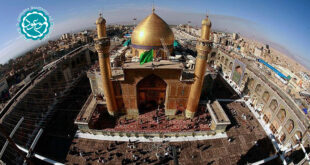But those who study the hadiths of the Holy Prophet and the Imams will see that they refer to this life as one possessing miraculous qualities. Miracles are certainly not impossible nor can they be negated through scientific arguments. It can never be proved that the causes and agents that are functioning in the world are solely those that we see and know and that other causes which we do not know or whose effects and actions we have not seen nor understood do not exist. It is in this way possible that in one or several members of makind there can be operating certain causes and agents which bestow upon them a very long life of a thousand or several thousand years. Medicine has not even lost hope of discovering a way to achieve very long life spans. In any case, such protests from “Peoples of the Book” such as Jews, Christians and Muslims are most strange for they accept the miracles of the prophets of God according to their own sacred scriptures.
The opponents of Shi’ism also protest that, although Shi’ism considers the Imam necessary in order to expound the injunctions and verities of religion and to guide the people, the occultation of the Imam is the negation of this very purpose, for an Imam in occultation who cannot be reached by mankind cannot be in any way beneficial or effective. The opponents say that if God wills to bring forth an Imam to reform mankind, He is able to create him at the necessary moment and does not need to create him thousands of years earlier.
In answer it must be said that such people have not really understood the meaning of the Imam, for in the discussion on the Imamate it became clear that the duty of the Imam is not only the formal explanation of the religious sciences and exoteric guidance of the people. In the same way that he has the duty of guiding men outwardly, the Imam also bears the function of walayah and the esoteric guidance of men. It is he who directs man’s spiritual life and orients the inner aspect of human action toward God. Clearly, his physical presence or absence has no effect in this matter. The Imam watches over men inwardly and is in communion with the soul and spirit of men even if he be hidden from their physical eyes. I{is existence is always necessary even if the time has not as yet arrived for his outward appearance and the universal reconstruction that he is to bring about.
Imam Mahdi (A.S.) Said: “Rest assured that no one has a special relationship with Allah. Whoever denies me is not my (follower). The appearance of the Relief (al-faraj) depends solely upon Allah; therefore, those who propose a certain time for it are liars. As to the benefit of my existence in Occultation, it is like the benefit of the sun behind clouds where the eyes do not see. Indeed, my existence is an amnesty for the people of the earth.Pray much to Allah to hasten the Relief, for therein also lies the release from your sufferings”.
The Imam, the just Guide, Hazrat Mahdi (A.S.) was born half-way through the month of Sha’ban in the year 255 A.H. in the town of Samarra, and in 260 A.H., when his great father died, he reached the exalted position of the Imamate. His name (Muhammad) and his agnomen (Abu’l-Qasim) are the same as the Prophet’s. His father, the 11th Shi’a Imam, was Hazrat Imam Hasan al-‘Askari (A.S.), and his mother, the great lady Nargis. For various reasons, the twelfth Imam, from the first day of his life, did not appear publicly, and for about seventy years people were in communication with him through the intermediary of his special representatives, in order of succession: ‘Uthman ibn Sa’id, Muhammad ibn ‘Uthman, Husayn ibn Ruh, and ‘Ali ibn Muhammad as-Samarri. This period of seventy years is known as the minor occultation (al-ghaybat as-sughra), and at the end of that period the major occultation (al-ghaybat al-kubra) began. During the major occultation till the time of his reappearance, no one has been his special representative, and there will be no one in the future, and the people have the duty to refer to the fuqaha, those excelling in knowledge of the shari’ah, and the narration of hadith who are specialised in the matters of the religion.
Belief in Hazrat Mahdi, and Universal Reform.
The belief in the reappearance of the expected Mahdi (A.S.)the universal reformer is not confined to the Shi’ite Muslims. Other Islamic groups and even non-Islamic groups like the Jews and the Christians and some of the great world intellectual figures believe in the appearance of a great spiritual reformer. In Psalm 37 is written: “…Trust in the Lord and do good; so you will dwell in the land, and enjoy security. …For the wicked shall be cut off: but those who wait for the Lord shall possess the land. …But the weak shall possess the land, and delight themselves in abundant prosperity. …The Lord knows the days of the flawless, and their heritage will abide forever. …For those blessed by the Lord, shall possess the land, but those cursed by Him shall be cut off. …The righteous shall possess the land, and dwell upon it at peace for ever…”
The Qur’an and belief in al-Mahdi
In the Qur’an a time is promised when the worshippers of Truth, the world’s people of righteousness, will take over the power and government of the world, and the glorious din of Islam will reign all over the earth. Other ayahs have been revealed which exegetically point to Hazrat Mahdi (A.S.).
“For We have written in the Psalms, after the Remembrance, ‘The earth shall be the inheritance of My righteous servants.” (XXI; 105)
“Allah has promised those of you who believe and do righteous deeds that He will surely make you successors in the land, even as He made those who were before them successors, and that He will surely establish their religion for them, and will give them in exchange, after their fear, security: They shall serve Me, not associating with Me anything. ” (XXIV:55)
“It is He Who has sent His Messenger with the religion of truth, that he may lift it above every religion, though the unbelievers be averse. (LXI:9)
“Yet We desired to be gracious to those that were abased in the land, and to make them leaders, and to make them the inheritors. ” (XXII:5)
The above ayahs clearly show that in the end the world will fall to the hands of Allah’s worthy and righteous servants and that they will become the leaders of the people of the world. Then Islam will be victorious over all religions.
Belief in al-Mahdi and the Sunni authorities
In this subject, the scholars in the Sunni school have related many hadiths from the Prophet of Islam, through narrators whom they themselves trust. From among them are such hadiths as tell that the Imams are twelve persons and that are all from the Quraysh. Al-Mahdi(A.S.), the promised one, is from the family of the Prophet and is a descendent of Hazrat ‘Ali and Hazrat Fatimah Zahra (A.S.), and in many of these hadiths it is mentioned that he is from the line of Imam Husayn (A.S.). They have mentioned and recorded hundreds of hadiths about the Mahdi in more than seventy books by their valued and dependable authorities of which we shall mention a few examples. al-Musnad of Ahmad ibn Hanbal (d. 241 A.H.) Sahih of al-Bukhari (d. 256 A.H.) Sahih of Muslim ibn Hajjaj Nishabouri (d. 261 A.H.) Sunan of Abu Dawud Sajistani (d. 275 A.H.) Sahih of Muhammad ibn ‘Isa at-Tirmidhi (d. 279 A.H.) The authors of the above books – each one of them among the most authoritative books of the Sunnis – died either before the birth of the Imam of the Age (225 A.H.) or shortly after his birth. Let us also mention: – Masabih as-Sunnah of al-Baghawi (d. 516 A.H.) Jami’ al-Usul of ibn al-Athir (d. 606 A H.) Al-Futuhat al-Makkiyyah of Muhyi’d-din ibn ‘Arabi (d.638 A.H.) Tadhkirat al-Khawass of Sibt ibn al-Jawzi (d. 654 A.H.) Fara’d as-Simtayn of al-Hamawi (d. 716 A.H.) as-Sawa’iq al-Muhriqah of Ibn Hajar al-Haytami (d. 973 A.H.) Yanabi’al-Mawaddah of Shaykh Sulayman al-Qunduzi (d.1293 A.H.) Some of the Sunni scholars have written books especially about the Imam of the Age:
1. Al-Bayan fi Akhbar Sahib az-Zaman of Al-Ganji ash-Shafi’i 2. ‘Iqd ad-Durar fi Akhbar al-Imam al-Muntazar of Shaykh Jamalu’d-din Yusuf al-Dimashqi 3. Mahdi Al ar-Rasul of ‘Ali ibn Sultan Muhammad al-Harawi al-Hanafi 4. Kitab al-Mahdi of Abu Dawud 5. ‘Alamat al-Mahdi of Jalalu’d-din as-Suyuti 6. Manaqib al-Mahdi of Hafiz Abu Nu’aim al-lsfahani 7. Al -Qawl al -Mukhtasar fi ‘Alamat al -Mahdi 8. al-Muntazar of Ibn Hajar 8. Al-Burhan fi ‘Alamat Mahdi Akhir az-Zaman of Mulla ‘Ali al-Muttaqi 9. Arba’un Hadith fi al-Mahdi of Abu’l-A’ la’al-Hamadani

 Mouood Mouood English Edition
Mouood Mouood English Edition



